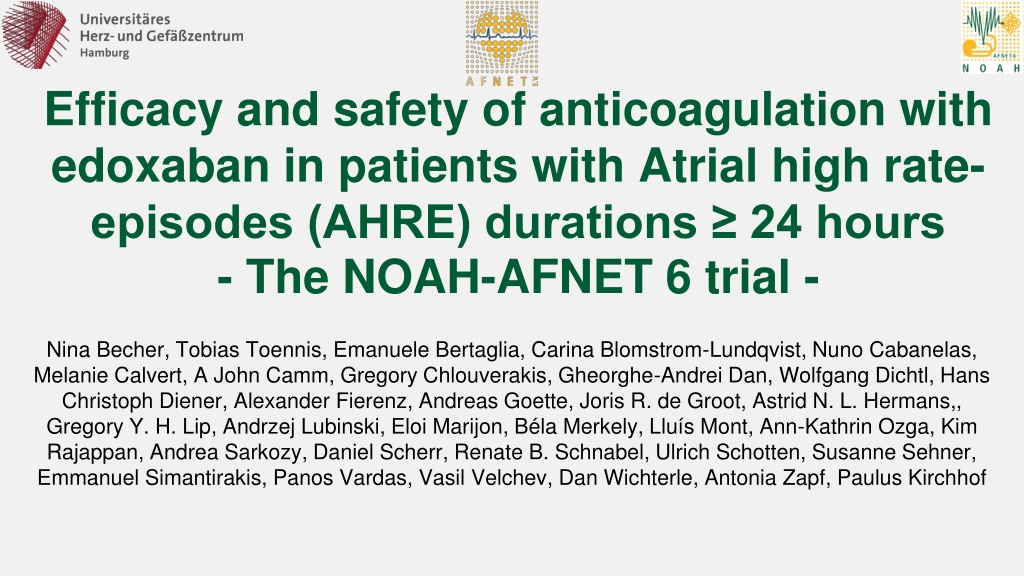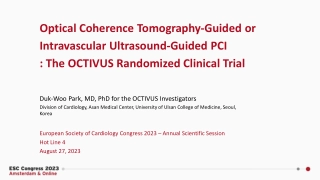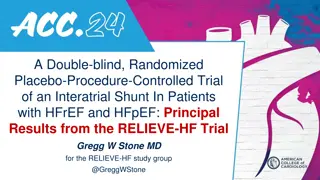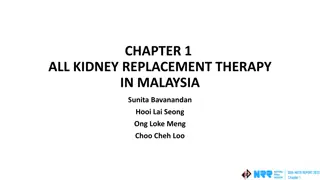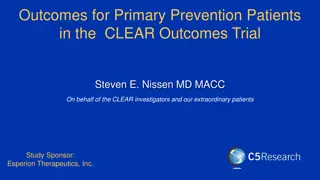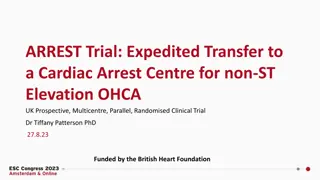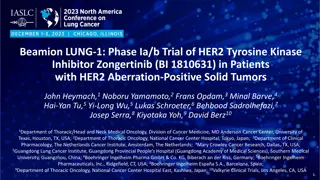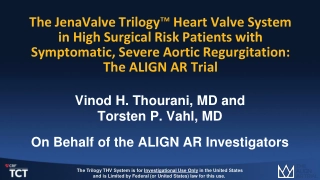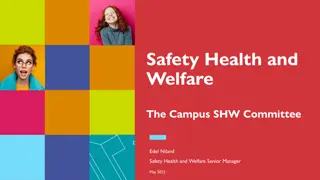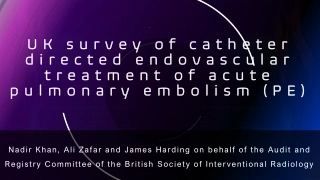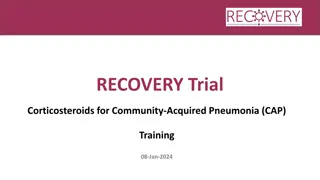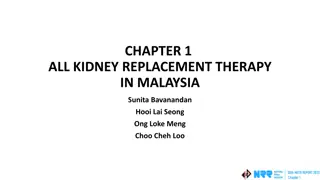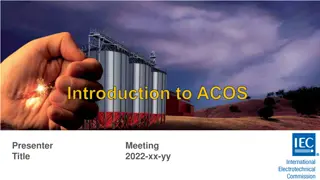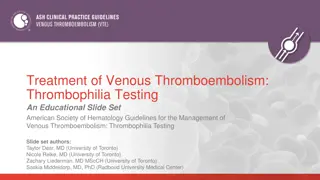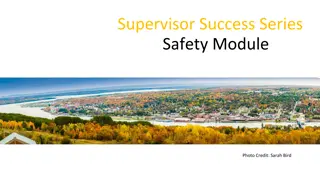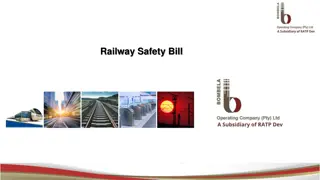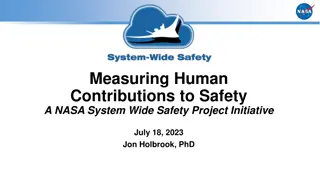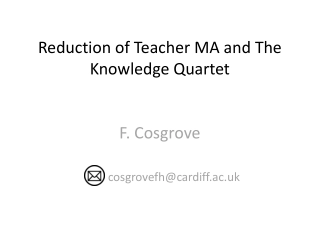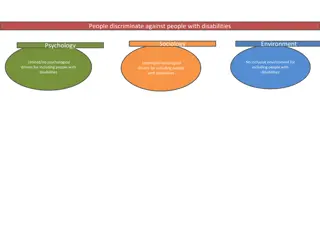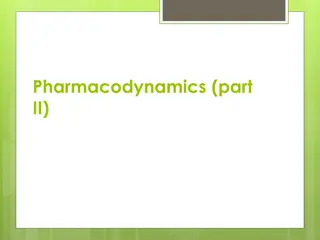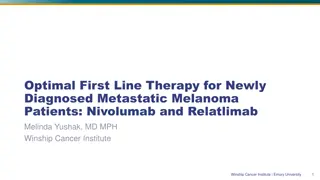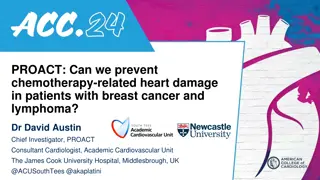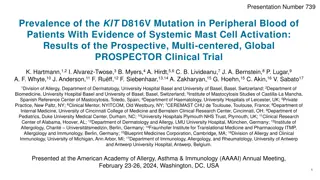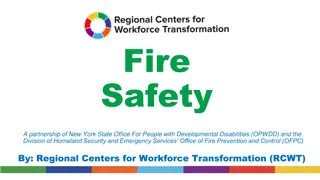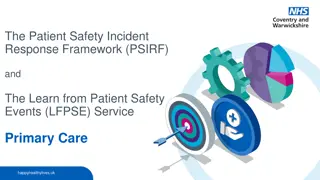Efficacy and Safety of Anticoagulation with Edoxaban in Patients with AHRE Durations ≥24 Hours: The NOAH-AFNET 6 Trial
A prespecified subanalysis of the NOAH-AFNET 6 trial evaluated the efficacy and safety of edoxaban anticoagulation in patients with Atrial High-Rate Episodes (AHRE) lasting 24 hours compared to shorter episodes. Findings suggest that oral anticoagulation with edoxaban does not significantly reduce the risk of stroke, systemic embolism, or CV death compared to no anticoagulation in these patients but may increase the risk of major bleeding. The study highlights the need for further research in this area. Key contributors include Nina Becher, Tobias Toennis, and Carina Blomstrom-Lundqvist.
Download Presentation
Please find below an Image/Link to download the presentation.
The content on the website is provided AS IS for your information and personal use only. It may not be sold, licensed, or shared on other websites without obtaining consent from the author. Download presentation by click this link. If you encounter any issues during the download, it is possible that the publisher has removed the file from their server.
Presentation Transcript
Efficacy and safety of anticoagulation with edoxaban in patients with Atrial high rate- episodes (AHRE) durations 24 hours - The NOAH-AFNET 6 trial - Nina Becher, Tobias Toennis, Emanuele Bertaglia, Carina Blomstrom-Lundqvist, Nuno Cabanelas, Melanie Calvert, A John Camm, Gregory Chlouverakis, Gheorghe-Andrei Dan, Wolfgang Dichtl, Hans Christoph Diener, Alexander Fierenz, Andreas Goette, Joris R. de Groot, Astrid N. L. Hermans,, Gregory Y. H. Lip, Andrzej Lubinski, Eloi Marijon, B la Merkely, Llu s Mont, Ann-Kathrin Ozga, Kim Rajappan, Andrea Sarkozy, Daniel Scherr, Renate B. Schnabel, Ulrich Schotten, Susanne Sehner, Emmanuel Simantirakis, Panos Vardas, Vasil Velchev, Dan Wichterle, Antonia Zapf, Paulus Kirchhof
Disclosures Dr. Nina Becher received speaker fees from Medtronic, Abbott and an educational grant from Biotronik not related to this work. The NOAH-AFNET 6 trial received financial support from the German Center for Cardiovascular Research, funded by the German Ministry of Education and Research (BMBF), and Daiichi Sankyo Europe. Sponsor of NOAH-AFNET 6 is AFNET.
Background Atrial high-rate episodes (AHRE) resemble short episodes of atrial fibrillation and are detected in every fifth patient with an implanted device.1 Stroke risk associated with AHRE is lower than the stroke risk associated with ECG-documented atrial fibrillation.2,3 The double-blind, double dummy Non vitamin K antagonist Oral anticoagulants in patients with Atrial High-rate episodes (NOAH-AFNET 6) trial found that oral anticoagulation with edoxaban does not markedly reduce a composite outcome of stroke, systemic embolism, or CV death compared to no anticoagulation in patients with AHRE and stroke risk factors but increased major bleedings.4 Observational studies suggest a higher stroke risk associated with AHRE lasting 24 hours or longer.5,6 Randomized data evaluating anticoagulation in patients with long AHRE are lacking. 1 Toennis et al. Europace 2023. DOI: 10.1093/europace/euad166; 2 Healey et al. NEJM 2012. DOI: 0.1056/NEJMoa1105575 3 Bertaglia et al. Europace 2019. DOI: 10.1093/europace/euz172; 4 Kirchhof et al. NEJM 2023. DOI: 0.1056/NEJMoa2303062; 5 Uittenbogaart et al. Europace 2018. DOI: 10.1093/europace/eux356; 6 Van Gelder et al. Eur Heart J 2017. DOI:10.1093/eurheartj/ehx042
Study Design and Objectives Prespecified subanalysis of NOAH-AFNET 6 To assess the efficacy and safety of oral anticoagulation with edoxaban compared to no anticoagulation in patients with AHRE lasting 24 hours compared to shorter episodes in the NOAH-AFNET 6 trial
CONSORT Flow Diagram of the Substudy All AHRE were reviewed by core lab. Patients were classified by duration of the longest AHRE episode at baseline Patients with core lab verified duration of longest AHRE at baseline All patients changed to open-label anticoagulation upon ECG-documentation of atrial fibrillation (ECG every 6 month)
Outcomes Primary efficacy outcome Composite of stroke, systemic embolism, or cardiovascular death Safety outcome Composite of ISTH major bleeding and all-cause death Key secondary outcomes Components of these outcomes ECG-diagnosed atrial fibrillation Post-hoc outcome Composite of ischemic stroke and systemic embolism excluding pulmonary embolism and myocardial infarction
Baseline Characteristics AHRE duration at baseline 24 hours AHRE duration at baseline <24 hours All Patients Edoxaban (N=132) Placebo (N=127) Edoxaban (N=1062) Placebo (N=1068) Total (N=2389) Age [years], mean SD 77 6.5 78 7.6 78 6.5 78 5.6 78 6.6 32/132 (24.2%) 40/127 (31.5%) 398/1062 (37.5%) 405/1068 (37.9%) 875/2389 (36.6%) Female Sex, N (%) CHA2DS2-VASc score, Median (Q1, Q3) 4 (3, 5) 4 (3, 5) 4 (3, 5) 4 (3, 5) 4 (3, 5) Prior stroke or transient ischemic attack, N (%) 11/132 (8.3%) 14/127 (11.0%) 101/1062 (9.5%) 112/1068 (10.5%) 238/2389 (10.0%) Modified HAS-BLED Score, median (Q1,Q3) 3 (3, 4) 3 (3, 4) 3 (3, 4) 3 (3, 4) 3 (3, 4) Maximum duration of AHRE [hours], median (Q1, Q3) Number of total AHRE, Median (Q1, Q3) 58.0 (30.7, 100.0) 52.5 (33.4, 96.0) 2.2 (0.7, 5.9) 2.2 (0.6, 5.9) 2.8 (0.8, 9.4) 10.5 (2.0, 36.2) 9.0 (2.0, 24.0) 4.0 (1.0, 15.0) 4.0 (1.0, 13.8) 4.0 (1.0, 15.0)
Duration of maximum AHRE at baseline AHRE 24 hours AHRE < 24 hours
Primary Efficacy Outcome (stroke, systemic embolism, or cardiovascular death) AHRE duration 24 hours Edoxaban (n=132) AHRE duration <24 hours Edoxaban (n=1062) p-value interaction Placebo (n=127) Placebo (n=1068) Patients with event Patients with event Primary efficacy outcome 9 14 70 80 0.65 Ischemic stroke Systemic embolism CV death 2 2 20 21 0.89 1 4 13 24 0.51 6 10 42 44 0.58 The results were consistent using AHRE as a continuous variable or using median AHRE duration.
Safety Outcome (major bleeding or death) AHRE duration 24 hours Edoxaban (n=132) AHRE duration <24 hours Edoxaban (n=1062) p-value interaction Placebo (n=127) Placebo (n=1068) Patients with event Patients with event 16 13 126 95 0.96 Safety outcome Major bleeding 12 11 92 78 0.69 Death 7 4 45 20 0.97 The results were consistent using AHRE as a continuous variable or using median AHRE duration.
ECG-diagnosed Atrial Fibrillation Incidence of ECG diagnosed atrial fibrillation (ECG every 6 months) AHRE duration 24 hours 17.0%/patient-year AHRE duration <24 hours 8.2%/patient-year HR 2.20 (95% CI 1.71, 2.84), p<0.001
Strengths and Limitations Prespecified secondary subanalysis of NOAH-AFNET 6 First randomized comparison of oral anticoagulation and placebo in patients with AHRE 24 hours. All episodes were reviewed by a core lab. 97% of AHRE resembles device-detected atrial fibrillation Number of ischemic events was too small to rule out effects of anticoagulation on stroke prevention. Enrolment confined to Europe, population predominantly Caucasian.
Conclusions In this prespecified subanalysis of the NOAH-AFNET 6 trial, the rate of stroke appeared low in patients with AHRE durations 24 hours. There was no interaction between the duration of the longest AHRE episode and the efficacy and safety of oral anticoagulation. Patients experiencing AHRE durations 24 hours are more likely to develop atrial fibrillation over time than those with shorter AHRE, calling for regular ECGs. Further research is needed to identify patients with AHRE at higher risk of stroke and other cardiovascular events.
